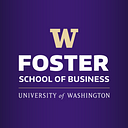UW Foster’s State of the Economy Forum Provides Global Perspectives and Practical Advice
The Foster School’s 2024 State of the Economy Forum included faculty and industry professionals addressing economic topics ranging from the impact of AI to investment strategies
Written by: David Fenigsohn, digital marketing manager, Foster School of Business
Speaking at the University of Washington Foster School of Business 2024 State of the Economy Forum presented by Whittier Trust, Community Attributes CEO Chris Mefford (MBA 2002) flipped the old adage that all politics is local on its head. Addressing an audience of over 250 business leaders and Foster students, faculty and alumni at the University of Washington, Mefford affirmed that all economics is global, including the school’s own role.
“How Washington State relates to the global economy is super important. Trade (is) one of the only ways you can expand a regional economy.” Mefford said “When the University of Washington trains an international student here in Seattle, that counts as an export. We are exporting that education, while their dollars come in and support the local economy.”
The event, held on April 3 at the Husky Union Building, was livestreamed to an audience of hundreds more on YouTube. Dennis Karlinsky (MBA 2001), served as moderator to an expert panel of Foster faculty members: Associate Professor Emeritus Ed Rice ; Teaching Professor and Faculty Director of the Global Business Center Debra Glassman , and Associate Professor Thomas Gilbert .
State of the Economy covers global perspectives and local impacts
Mefford delivered a high-level overview of the state of the economy that despite facing challenges, is fundamentally strong from a global perspective all the way down to employment rates in the Puget Sound region. Presenting a trove of in-depth data, Mefford touched on everything from a wealth comparison between the United States and China to Boeing’s prospects after recent safety mishaps.
Inflation and interest rates were major topics throughout the evening. “I love where the interest rates are now,” Medford said, citing the essential role higher interest rates play in keeping inflation under control.
State of the Economy audience questions ranged from AI to investing
Following his address, Medford joined the faculty members on the panel to answer questions submitted by audience members on topics ranging from the impact of artificial intelligence (AI) to optimal investment strategies.
The three professors generally concurred with Mefford’s assessment of the economy but addressed a sharp disconnect between excellent economic data and consumer sentiment.
“The S&P is at record highs … unemployment is at historic lows … All these numbers are extraordinary. This is a solid economy,” Gilbert said. “(Yet) consumer sentiment is at record lows. This is a big dichotomy between the numbers we hear and how people feel … The young generation feels like things could disappear in an instant.” Gilbert cited the adjustment to rising prices as a contributing factor. Glassman pointed out that tech layoffs generate extensive outsized media coverage, while those workers finding new roles doesn’t make news.
Regarding AI, the panelists expressed it was too early to accurately assess what impact it will have. Rice pointed out that even if AI does prove to be a transformative technology, the companies that are at the forefront of AI today are unlikely to be the ones who ultimately benefit the most.
Asked for investment advice, Gilbert joked “Nvidia 100%” followed quickly with “no, you’re too late.” Gilbert then counseled an approach which he discusses with his students, hands-off investment solely in the S&P 500. He shared his personal UW retirement allocation, which is “still 100% in the Vanguard 500 Index, paying one basis point in fees.”. Rice countered with a belief that “diversification matters” and discussed consideration of bonds, international stocks and commodities in addition to stocks in the S&P 500.
Following additional discussion on The Fed and trade with China, Karlinsky surprised panelists with a lighthearted moment — video from the prior year’s event in which they were asked to make predictions. Despite their expertise, the panelists did not fare very well — Glassman predicted a recession, Gilbert thought gas would be below $4 a gallon, and Rice asserted China would take military action, none of which came to pass.
Nonetheless, the panelists were game to try again this year, though they were more cautious in offering specifics.
In an effort to ensure at least one of his predictions would be a sure thing, Gilbert said “I’m willing to predict that Nvidia will not double in market capitalization,” drawing further laughs from the audience.
To learn all of the insights and opinions offered up during the event, watch a replay here.
